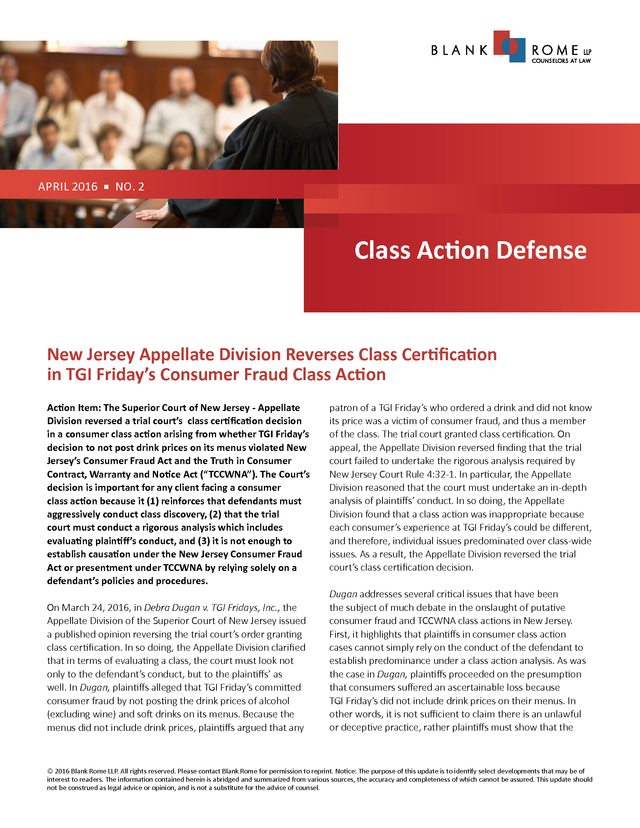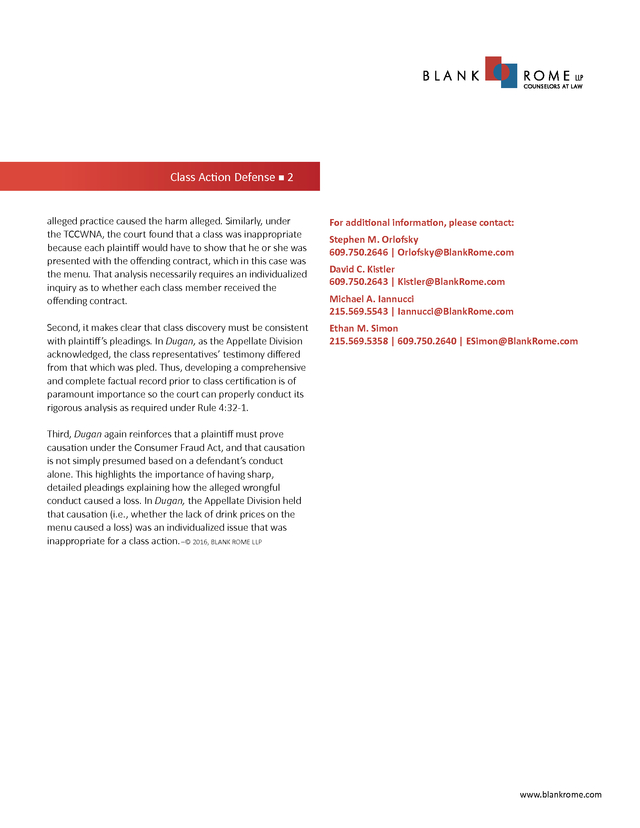New Jersey Appellate Division Reverses Class Certification in TGI Friday’s Consumer Fraud Class Action – April 2, 2016
Blank Rome
Description
APRIL 2016 n NO. 2
Class Action Defense
New Jersey Appellate Division Reverses Class Certification
in TGI Friday’s Consumer Fraud Class Action
Action Item: The Superior Court of New Jersey - Appellate
Division reversed a trial court’s class certification decision
in a consumer class action arising from whether TGI Friday’s
decision to not post drink prices on its menus violated New
Jersey’s Consumer Fraud Act and the Truth in Consumer
Contract, Warranty and Notice Act (“TCCWNA”). The Court’s
decision is important for any client facing a consumer
class action because it (1) reinforces that defendants must
aggressively conduct class discovery, (2) that the trial
court must conduct a rigorous analysis which includes
evaluating plaintiff’s conduct, and (3) it is not enough to
establish causation under the New Jersey Consumer Fraud
Act or presentment under TCCWNA by relying solely on a
defendant’s policies and procedures.
On March 24, 2016, in Debra Dugan v. TGI Fridays, Inc., the
Appellate Division of the Superior Court of New Jersey issued
a published opinion reversing the trial court’s order granting
class certification.
In so doing, the Appellate Division clarified that in terms of evaluating a class, the court must look not only to the defendant’s conduct, but to the plaintiffs’ as well. In Dugan, plaintiffs alleged that TGI Friday’s committed consumer fraud by not posting the drink prices of alcohol (excluding wine) and soft drinks on its menus. Because the menus did not include drink prices, plaintiffs argued that any patron of a TGI Friday’s who ordered a drink and did not know its price was a victim of consumer fraud, and thus a member of the class.
The trial court granted class certification. On appeal, the Appellate Division reversed finding that the trial court failed to undertake the rigorous analysis required by New Jersey Court Rule 4:32-1. In particular, the Appellate Division reasoned that the court must undertake an in-depth analysis of plaintiffs’ conduct.
In so doing, the Appellate Division found that a class action was inappropriate because each consumer’s experience at TGI Friday’s could be different, and therefore, individual issues predominated over class-wide issues. As a result, the Appellate Division reversed the trial court’s class certification decision. Dugan addresses several critical issues that have been the subject of much debate in the onslaught of putative consumer fraud and TCCWNA class actions in New Jersey. First, it highlights that plaintiffs in consumer class action cases cannot simply rely on the conduct of the defendant to establish predominance under a class action analysis. As was the case in Dugan, plaintiffs proceeded on the presumption that consumers suffered an ascertainable loss because TGI Friday’s did not include drink prices on their menus.
In other words, it is not sufficient to claim there is an unlawful or deceptive practice, rather plaintiffs must show that the © 2016 Blank Rome LLP. All rights reserved. Please contact Blank Rome for permission to reprint.
Notice: The purpose of this update is to identify select developments that may be of interest to readers. The information contained herein is abridged and summarized from various sources, the accuracy and completeness of which cannot be assured. This update should not be construed as legal advice or opinion, and is not a substitute for the advice of counsel. .
Class Action Defense n 2 alleged practice caused the harm alleged. Similarly, under the TCCWNA, the court found that a class was inappropriate because each plaintiff would have to show that he or she was presented with the offending contract, which in this case was the menu. That analysis necessarily requires an individualized inquiry as to whether each class member received the offending contract. For additional information, please contact: Second, it makes clear that class discovery must be consistent with plaintiff’s pleadings. In Dugan, as the Appellate Division acknowledged, the class representatives’ testimony differed from that which was pled.
Thus, developing a comprehensive and complete factual record prior to class certification is of paramount importance so the court can properly conduct its rigorous analysis as required under Rule 4:32-1. Ethan M. Simon 215.569.5358 | 609.750.2640 | ESimon@BlankRome.com Stephen M. Orlofsky 609.750.2646 | Orlofsky@BlankRome.com David C.
Kistler 609.750.2643 | Kistler@BlankRome.com Michael A. Iannucci 215.569.5543 | Iannucci@BlankRome.com Third, Dugan again reinforces that a plaintiff must prove causation under the Consumer Fraud Act, and that causation is not simply presumed based on a defendant’s conduct alone. This highlights the importance of having sharp, detailed pleadings explaining how the alleged wrongful conduct caused a loss.
In Dugan, the Appellate Division held that causation (i.e., whether the lack of drink prices on the menu caused a loss) was an individualized issue that was inappropriate for a class action. –© 2016, BLANK ROME LLP www.blankrome.com .
In so doing, the Appellate Division clarified that in terms of evaluating a class, the court must look not only to the defendant’s conduct, but to the plaintiffs’ as well. In Dugan, plaintiffs alleged that TGI Friday’s committed consumer fraud by not posting the drink prices of alcohol (excluding wine) and soft drinks on its menus. Because the menus did not include drink prices, plaintiffs argued that any patron of a TGI Friday’s who ordered a drink and did not know its price was a victim of consumer fraud, and thus a member of the class.
The trial court granted class certification. On appeal, the Appellate Division reversed finding that the trial court failed to undertake the rigorous analysis required by New Jersey Court Rule 4:32-1. In particular, the Appellate Division reasoned that the court must undertake an in-depth analysis of plaintiffs’ conduct.
In so doing, the Appellate Division found that a class action was inappropriate because each consumer’s experience at TGI Friday’s could be different, and therefore, individual issues predominated over class-wide issues. As a result, the Appellate Division reversed the trial court’s class certification decision. Dugan addresses several critical issues that have been the subject of much debate in the onslaught of putative consumer fraud and TCCWNA class actions in New Jersey. First, it highlights that plaintiffs in consumer class action cases cannot simply rely on the conduct of the defendant to establish predominance under a class action analysis. As was the case in Dugan, plaintiffs proceeded on the presumption that consumers suffered an ascertainable loss because TGI Friday’s did not include drink prices on their menus.
In other words, it is not sufficient to claim there is an unlawful or deceptive practice, rather plaintiffs must show that the © 2016 Blank Rome LLP. All rights reserved. Please contact Blank Rome for permission to reprint.
Notice: The purpose of this update is to identify select developments that may be of interest to readers. The information contained herein is abridged and summarized from various sources, the accuracy and completeness of which cannot be assured. This update should not be construed as legal advice or opinion, and is not a substitute for the advice of counsel. .
Class Action Defense n 2 alleged practice caused the harm alleged. Similarly, under the TCCWNA, the court found that a class was inappropriate because each plaintiff would have to show that he or she was presented with the offending contract, which in this case was the menu. That analysis necessarily requires an individualized inquiry as to whether each class member received the offending contract. For additional information, please contact: Second, it makes clear that class discovery must be consistent with plaintiff’s pleadings. In Dugan, as the Appellate Division acknowledged, the class representatives’ testimony differed from that which was pled.
Thus, developing a comprehensive and complete factual record prior to class certification is of paramount importance so the court can properly conduct its rigorous analysis as required under Rule 4:32-1. Ethan M. Simon 215.569.5358 | 609.750.2640 | ESimon@BlankRome.com Stephen M. Orlofsky 609.750.2646 | Orlofsky@BlankRome.com David C.
Kistler 609.750.2643 | Kistler@BlankRome.com Michael A. Iannucci 215.569.5543 | Iannucci@BlankRome.com Third, Dugan again reinforces that a plaintiff must prove causation under the Consumer Fraud Act, and that causation is not simply presumed based on a defendant’s conduct alone. This highlights the importance of having sharp, detailed pleadings explaining how the alleged wrongful conduct caused a loss.
In Dugan, the Appellate Division held that causation (i.e., whether the lack of drink prices on the menu caused a loss) was an individualized issue that was inappropriate for a class action. –© 2016, BLANK ROME LLP www.blankrome.com .













